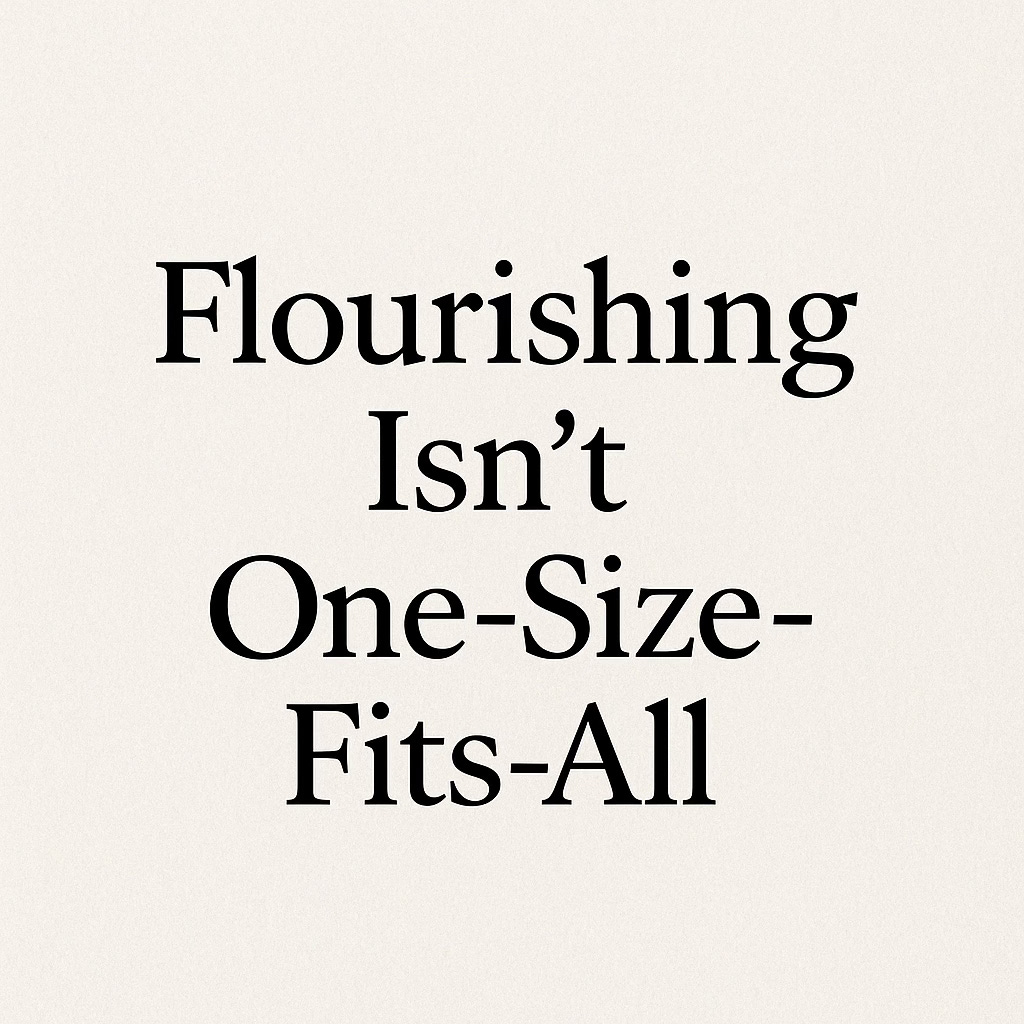Flourishing Isn’t One-Size-Fits-All
From the THX Series Hub: Disability, Autism & THX
Listen to the podcast
The word flourishing is everywhere these days—in wellness, education, public health, leadership. And for good reason: it asks a better question than “Are you productive?” or “Are you compliant?”
It asks: Are you whole? Are you thriving, connected, growing, at peace?
But what if flourishing, as it’s most commonly defined, only fits the people the system was built for?
This post reframes PERMAH, a positive psychology model for human flourishing, through the lens of disability and neurodivergence. Not to reject the model—but to reshape it for lives that aren’t average, easy, or expected.
The THX View of PERMAH
As a father of two daughters with complex medical and neurodivergent needs, I’ve seen firsthand how traditional ideas of flourishing can feel completely out of reach.
There have been nights filled with worry—when one daughter was in debilitating pain, or another was spiraling into self-doubt before a test. Days when I had to be a researcher, a case manager, an advocate, a translator of dense medical studies just to keep up with the latest options for their care. I’ve spent years using my own neurodivergence to dig deep, connect dots, push for answers. But the anxiety often consumes me. And while I fight for their futures, I neglect my own health to make sure they don’t have to choose between medication and rent.
Flourishing, in this context, isn’t about thriving—it’s about surviving with purpose. It’s about redefining what thrivingeven means when the system demands everything and offers little in return.
That’s where PERMAH comes in—but only if we reframe it.
PERMAH stands for:
Positive Emotion
Engagement
Relationships
Meaning
Achievement
Health & Wellbeing
It’s a powerful framework—but one that requires reinterpretation when your energy is spent surviving the system, not benefiting from it.
Let’s break each one down:
Positive Emotion
Flourishing isn’t about forcing positivity. It’s about access to genuine moments of calm, joy, pride, hope, and safety.
For many disabled and neurodivergent people, systems produce fear, shame, and exhaustion. In that environment, the absence of dread is progress. Relief is joy.
When systems reduce harm, they make room for real emotional grounding.
Engagement
The ability to focus or “get in flow” is often viewed as an internal trait. But for many, it’s environmental.
If a classroom is too loud, a workspace too bright, a form too unclear, or a social norm too unpredictable—engagement disappears. That’s not a failure of attention. It’s a failure of design.
Flourishing means access to the conditions that allow you to engage—your way.
Relationships
Relational safety is everything. But for people who communicate differently, who’ve been isolated, or misjudged, relationships often carry risk.
Flourishing doesn’t mean being surrounded by people. It means having at least one space where you don’t have to mask, translate, or apologize for being yourself.
Meaning
Meaning is often shaped by contribution and connection. But if you’re constantly denied access, or told your needs are too much, you may internalize the idea that your life has less meaning.
Flourishing means reframing value—not by what you produce or overcome, but by who you are and how you persist.
Achievement
Achievement is often defined by milestones: grades, jobs, income, productivity.
But what if success is getting out of bed with less pain today than yesterday? What if achievement is sending the email, making the call, or surviving the meeting without shutdown?
Flourishing requires redefining success in ways that honor your reality—not invalidate it.
Health & Wellbeing
The foundation of all the rest.
When navigating the healthcare system requires 30 phone calls, emotional fortitude, translation, documentation, justification, and luck—health becomes a privilege, not a baseline.
Flourishing means systems that support wellbeing—not systems that expect heroism.
Redesigning the Definition
PERMAH is not wrong. It’s just unfinished.
When we redesign flourishing for disabled and neurodivergent lives, we don’t shrink the definition. We expand it—for everyone.
Because no one benefits from a system that only works for the few.
Let’s redesign it for the many.
Let’s redesign it for you.

Interpretation:
The structured typography and neutral palette reflect the clarity and emotional neutrality often expected by systems—while the message disrupts that expectation with a bold, personal truth: thriving isn’t standard. It’s sacred, and it’s specific.



